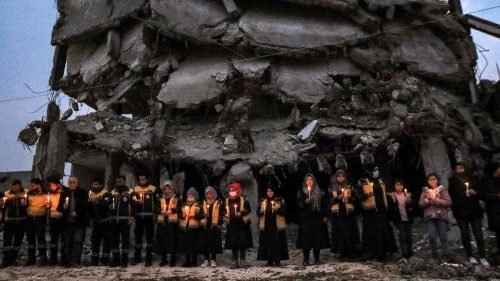By Alexandra Sirgant and Lisa Zengarini
A year ago, a 7.8-magnitude earthquake rocked southeast Türkiye and north Syria, with thousands of aftershocks, resulting in a total of nearly 60,000 deaths.
In Syria, a country already ravaged by thirteen years of war, the disaster killed between 6,000 and 10,000 people.
A year on since that night of 6 February the fear of new devastating tremors still haunts the inhabitants of the affected regions, already marked by the violence of war and now facing an unprecedented economic crisis that has plunged the population into poverty.
Added to this is the recent cessation of food aid from the United Nations World Food Programme (WFP), which fed nearly 5.6 million Syrians, due to funding shortages.
Blue Marist Brother Georges Sabé lives in Aleppo, one of the Syrian northwest cities most affected by the earthquake.
In an interview with Vatican News’ Alexandra Sirgant, Br. Blue pleads with the international community not to “abandon a suffering population”, and also explains his daily work to help restore hope for the inhabitants of Aleppo.
Material damage and psychological trauma
500 to 600 families in the city who had their houses destroyed are still displaced. Many others continue to live in their own damaged homes despite being unsafe because there is nowhere else to go and reconstruction is yet forthcoming.
Aside from the material damage, explained Brother Sabé, there is the psychological trauma: “Fear has taken hold of many people, whether children, adults, young people, or older people,” he said. “For some time, many people continued to sleep with their clothes on because they were afraid it would happen again. There are children who, until now, have had a lot of difficulty separating from their parents at night and some even during the day.”
Rebuilding people’s sense of security is therefore one of the priorities today, along with rebuilding houses, said the Blue Marist brother, noting that the earthquake adds to the trauma of war.
International sanctions on Syria affect the population
One of the consequences of the war is the economic crisis resulting from the sanctions imposed on Syria.
Although the international community claims they are not directed against the Syrian people, the sanctions heavily affect the population in daily life.
“For example, it’s winter now, and we only have two hours of electricity a day. This means that we are constantly looking for ways to keep warm,” Brother Sabé explained.
Scarce international aid
The Marist Brother further lamented the scarce humanitarian aid from NGO’s and international organizations.
He recalled that since January 1, 2024, the UN World Food Programme (WFP) has stopped all aid to Syria. “Personally, I believe that on this point, we do not have the right to abandon a suffering population,” he said.
“We need to live with dignity”
He therefore pleads for help from the international community.
“We need to live with dignity. We are not beggars, but we have experienced so many difficulties, so many problems, and so much misfortune that the aid coming from humanity must help us get back on our feet, not reduce us to begging.”
Hope is still possible
Despite this bleak picture, according to Brother Sabé, there is still space for hope based on faith.
“We must believe that hope is possible and that the Lord does not abandon us and based on this hope, we must meet others,” he said. “Our faith helps us to move forward.”
And this is the main goal of the Blue Marists work in Aleppo. “We are working to continue sowing hope in concrete ways: with food baskets, psychological support, education, the promotion of human development, and financial assistance to pay rent.”



